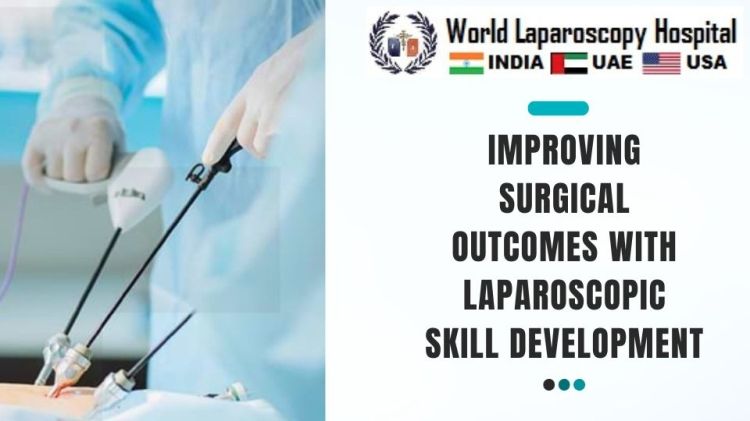Improving Surgical Outcomes with Laparoscopic Skill Development
Introduction:
In the ever-evolving landscape of modern medicine, surgical techniques continue to advance, pushing the boundaries of what was once deemed impossible. Among these innovations, laparoscopic surgery stands out as a game-changer, offering minimally invasive procedures that enhance patient outcomes and recovery times. This article delves into the realm of laparoscopic skill development and its pivotal role in improving surgical outcomes.

Understanding Laparoscopic Surgery:
Laparoscopic surgery, also known as minimally invasive surgery, involves performing operations through small incisions with the aid of a camera. Unlike traditional open surgery, laparoscopy allows surgeons to navigate the internal structures of the body using specialized instruments. The benefits of this approach are manifold, ranging from reduced postoperative pain to shorter hospital stays.
Advantages of Laparoscopic Surgery:
Minimized Tissue Trauma:
The smaller incisions in laparoscopic surgery result in less damage to surrounding tissues, reducing the risk of complications and promoting faster healing.
Faster Recovery:
Patients undergoing laparoscopic procedures often experience shorter recovery times compared to those undergoing traditional open surgery, leading to quicker return to daily activities.
Reduced Pain and Scarring:
The minimally invasive nature of laparoscopy translates to decreased postoperative pain and smaller, more cosmetically appealing scars.
The Importance of Laparoscopic Skill Development:
While the benefits of laparoscopic surgery are evident, the proficiency of the surgeon plays a pivotal role in determining the success of these procedures. Skill development in laparoscopy is a continuous process that involves training, practice, and staying abreast of technological advancements.
Laparoscopic Training Programs:
Simulation-Based Training:
Virtual reality and simulator-based training programs provide surgeons with a risk-free environment to practice and refine their laparoscopic skills. These programs simulate real surgical scenarios, allowing for repeated practice and skill enhancement.
Hands-On Workshops:
Live workshops and hands-on training sessions provide surgeons with the opportunity to practice laparoscopic techniques on models or cadavers under the guidance of experienced instructors. This interactive approach accelerates the learning curve and fosters confidence in handling complex procedures.
Incorporating Laparoscopic Skills into Surgical Residency Programs:
Early Exposure:
Integrating laparoscopic training into surgical residency programs exposes aspiring surgeons to minimally invasive techniques early in their careers. This exposure allows them to familiarize themselves with the instruments and develop essential skills from the outset.
Mentorship and Collaboration:
Establishing mentorship programs and encouraging collaboration between experienced laparoscopic surgeons and those in training fosters a culture of continuous learning. Learning from seasoned professionals accelerates skill development and knowledge transfer.
Technological Advances in Laparoscopy:
As technology continues to advance, so does the landscape of laparoscopic surgery. The integration of robotics, advanced imaging, and artificial intelligence (AI) has further enhanced the precision and capabilities of laparoscopic procedures.
Robotic-Assisted Laparoscopy:
Enhanced Dexterity:
Robotic systems offer surgeons enhanced dexterity and precision, allowing for more intricate and delicate maneuvers during surgery.
Improved Visualization:
High-definition 3D imaging provided by robotic systems enhances the surgeon's visualization of the surgical site, leading to improved decision-making and outcomes.
Artificial Intelligence in Laparoscopy:
Augmented Reality:
AI applications in laparoscopy include augmented reality overlays, providing surgeons with real-time information and guidance during procedures.
Predictive Analytics:
AI algorithms can analyze patient data to predict potential complications, allowing surgeons to proactively address issues and optimize surgical outcomes.
Overcoming Challenges in Laparoscopic Skill Development:
Despite the advancements in laparoscopic surgery, challenges persist in the path to mastering these techniques. Addressing these challenges is essential for ensuring widespread proficiency among surgeons.
Ergonomic Considerations:
Fatigue Management:
Prolonged laparoscopic procedures can lead to surgeon fatigue. Training programs should incorporate strategies for fatigue management and ergonomic considerations to prevent complications.
Team Collaboration:
Laparoscopic surgery often involves a team of healthcare professionals. Effective communication and coordination among team members are crucial for ensuring the success of these procedures.
Continuous Learning:
Continuing Medical Education (CME):
Given the rapid evolution of laparoscopic techniques and technologies, incorporating laparoscopy-focused CME programs ensures that surgeons stay current with the latest advancements.
Peer Learning and Collaboration:
Establishing platforms for peer learning and collaboration allows surgeons to share experiences, discuss challenging cases, and learn from one another, fostering a culture of continuous improvement.
Case Studies and Success Stories:
Highlighting real-world case studies and success stories showcases the tangible impact of laparoscopic skill development on surgical outcomes. These examples serve as inspiration for aspiring surgeons and reinforce the importance of investing in laparoscopic training.
Conclusion:
Laparoscopic surgery has emerged as a transformative force in the field of surgery, offering patients less invasive options and faster recoveries. The key to maximizing the benefits of laparoscopy lies in the continuous development of surgical skills. Through structured training programs, technological integration, and a commitment to lifelong learning, surgeons can elevate their laparoscopic proficiency, ultimately leading to improved surgical outcomes and enhanced patient care. As we navigate the future of surgical innovation, the mastery of laparoscopic techniques stands as a cornerstone in the pursuit of precision, efficiency, and excellence in healthcare.
